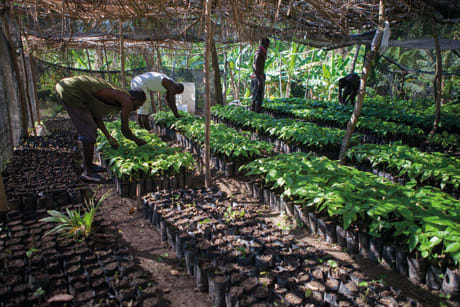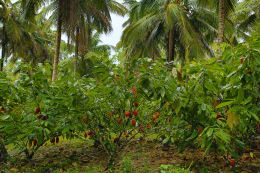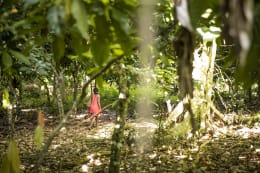Valrhona and the Cocoa and Forest Initiative
About Cocoa Forest Initiative
We are proud to be part of the Cocoa and Forests Initiative (CFI) through which we join forces with companies and the governments of Ivory Coast and Ghana to tackle one of the most pressing issues of our time – deforestation – and together create a cocoa sector in which producers and forests flourish. We know we can only create the far-reaching change that is so urgently needed if we all work together. For us at Valrhona, CFI is a ground-breaking opportunity to do just this.
We believe that the existence of healthy forests and thriving biodiversity is a Human Right, as important as proper working conditions for cocoa producers, the absence of child labor, women's rights and good living and housing conditions. We have a duty to protect the environment in cocoa producing countries and to bring together our cocoa-producing partners to invent a blueprint for responsible agriculture. This belief informs not only our decision to join CFI, but also our choice to make protecting forests and biodiversity key elements of our sustainability program Live Long.
Our 2018 CFI action plan
By 2022, as part of CFI, we will work hand in hand with our Ghanaian and Ivoirian cocoa partners FEDCO and Ecookim& Capedig, as well as the 1650 producers who supply us, to create a sustainable and transparent cocoa supply chain with forests at its heart. We will do so by ensuring traceability right down to the farm, fighting deforestation and supporting farmers to adopt of responsible agricultural practices.
We have chosen to focus our CFI actions around the themes of Forest Protection&Restoration, Sustainable Production and Farmer Livelihoods.
By the end of 2019, we will:
- Make 100% of our cocoa sourcing traceable to the farm to ensure that our cocoa is not being sourced from forest lands, National Parks and Reserves, and Classified Forests and that no further forest land is converted for cocoa production.
- Conduct farm mapping of the 1650 farms we source from to identify and collect cocoa farm boundaries.
By the end of 2022 we will:
- Carry out deforestation risk assessments in all direct sourcing areas.
- Implement traceability systems to the farm level.
- Support cocoa farm rehabilitation.
- Train 1280 farmers in Good Agricultural Practices.



